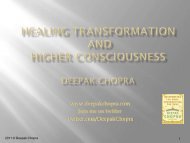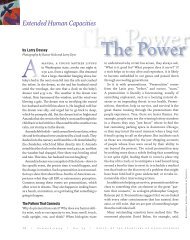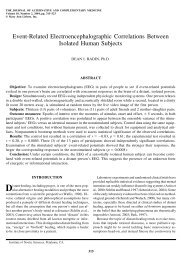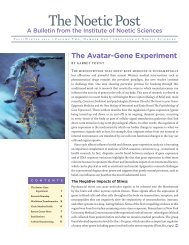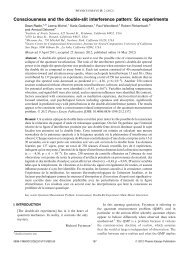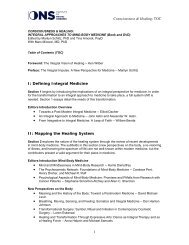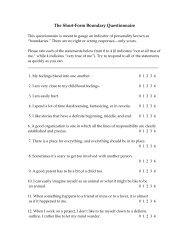Consciousness & Healing - Institute of Noetic Sciences
Consciousness & Healing - Institute of Noetic Sciences
Consciousness & Healing - Institute of Noetic Sciences
You also want an ePaper? Increase the reach of your titles
YUMPU automatically turns print PDFs into web optimized ePapers that Google loves.
• Happiness correlates with desirable consequences,<br />
such as sociability, creativity, better marriages,<br />
better work performance, stronger physical immunity,<br />
and resilience in the face <strong>of</strong> adversity.<br />
• Some cultures have higher levels <strong>of</strong> happiness than<br />
other cultures. One reason seems to be that in some<br />
cultures happiness is valued more.<br />
• People in unstable and very poor societies avow<br />
lower levels <strong>of</strong> happiness.<br />
• Most people are at least slightly happy, but everyone<br />
has up and down moods; no one is happy every<br />
moment. Even the happiest people sometimes<br />
get unhappy.<br />
• Enduring happiness comes not from running the<br />
hedonic treadmill but from working for goals that<br />
are consistent with our cherished values.<br />
In short, there seems to be no single key to happiness;<br />
a variety <strong>of</strong> factors are at play for us all. “We have learned<br />
some important things about subjective well-being, but<br />
there is much that is still uncertain,” says Diener.<br />
Feeling What Is Real<br />
Despite all the feel-good research on happiness, there has<br />
also been a backlash to the scrutiny and preoccupation.<br />
In his book Against Happiness, Eric Wilson, a pr<strong>of</strong>essor<br />
<strong>of</strong> English at Wake Forest University, makes a case<br />
for our more sober emotions and their “integral place<br />
in the great rhythm <strong>of</strong> the cosmos.” Melancholia, for<br />
example, is the source <strong>of</strong> much <strong>of</strong> our great art, poetry,<br />
and music. “The blues can be a catalyst for a special kind<br />
<strong>of</strong> genius,” Wilson points out, “a genius for exploring<br />
dark boundaries between opposites.” And as Aldous<br />
Huxley’s hero John the Savage put it when he recoiled<br />
from the monotonously cheery, pleasure-principled,<br />
soma-treated society in Brave New World: “I don’t want<br />
comfort. I want God. I want poetry. I want real danger.<br />
I want freedom. I want goodness.”<br />
In their 2007 book, The Loss <strong>of</strong> Sadness, Jerome<br />
Wakefield and Allan Horwitz examine “how psychiatry<br />
has transformed normal sorrow into depressive disorder.”<br />
Wakefield, pr<strong>of</strong>essor <strong>of</strong> social work at New York<br />
University, and Horwitz, dean <strong>of</strong> social and behavioral<br />
sciences at Rutgers University, argue that the American<br />
Psychiatric Association’s Diagnostic and Statistical<br />
Manual <strong>of</strong> Mental Disorders defines major depression in<br />
terms that, except for the death <strong>of</strong> a loved one, do not<br />
contextualize the differences between dysfunctional<br />
states <strong>of</strong> depression and those brought about by hardship<br />
and stress. Their critique <strong>of</strong> the pathologizing <strong>of</strong><br />
legitimate sadness—“the normal range <strong>of</strong> human emotion<br />
is not being tolerated”—includes discussion <strong>of</strong> “the<br />
middle-class hypochondria that the drug companies<br />
have so assiduously encouraged and exploited.” Pharmaceutical<br />
research developments and the industry’s<br />
marketing machine further inform and complicate our<br />
endeavor to be happy.<br />
According to large-scale, data-heavy studies from<br />
Ed Diener and his colleagues Shigehiro Oishi, associate<br />
pr<strong>of</strong>essor <strong>of</strong> psychology at University <strong>of</strong> Virginia, and<br />
Richard E. Lucas, associate pr<strong>of</strong>essor <strong>of</strong> psychology at<br />
Michigan State University, there is a measured trade<strong>of</strong>f<br />
when we become too shiny and happy. Summarizing<br />
the data from a study published in Perspectives on<br />
Psychological Science (December 2007), Lucas says, “Once<br />
a moderate level <strong>of</strong> happiness is achieved, further increases<br />
can sometimes be detrimental” to income and career,<br />
educational advancement, and political participation.<br />
A measure <strong>of</strong> discontent motivates us to improve, where<br />
we can, not only ourselves and our circumstances but also<br />
the welfare <strong>of</strong> others and our larger communities.<br />
The panel <strong>of</strong> scientists and experts at the Happiness<br />
Conference in San Francisco agreed with this assess-<br />
ment <strong>of</strong> the relative place happiness holds among the<br />
full range <strong>of</strong> human emotions and values. “Happiness<br />
is not the absence <strong>of</strong> sadness,” said David Spiegel,<br />
medical director <strong>of</strong> the Center for Integrative Medicine<br />
at Stanford University, whose award- winning<br />
work with cancer patients has shown the healing<br />
benefits <strong>of</strong> “feeling what is real” and actively coping<br />
with distress. Bringing different areas <strong>of</strong> expertise,<br />
research, and experience to the discussion, the<br />
scientific panel, one by one, affirmed commonly held<br />
philosophical wisdom: Accept suffering. Confidence is the<br />
result <strong>of</strong> understanding your emotions and knowing how to<br />
navigate through them. Happiness is a process, not a goal—<br />
a means, not an end. Prioritize for meaning, not happiness.<br />
measuring Collective Happiness<br />
An individual’s pursuit <strong>of</strong> happiness may be as natural<br />
and self-evident an inalienable right as life and liberty,<br />
but how are we faring as a group? A 2003 Pew Research<br />
Spring 2 0 0 9 | N o . 2 2 | S H I F T: A T T H E F RONTIERS OF C ONSCIOUSNESS | 17



